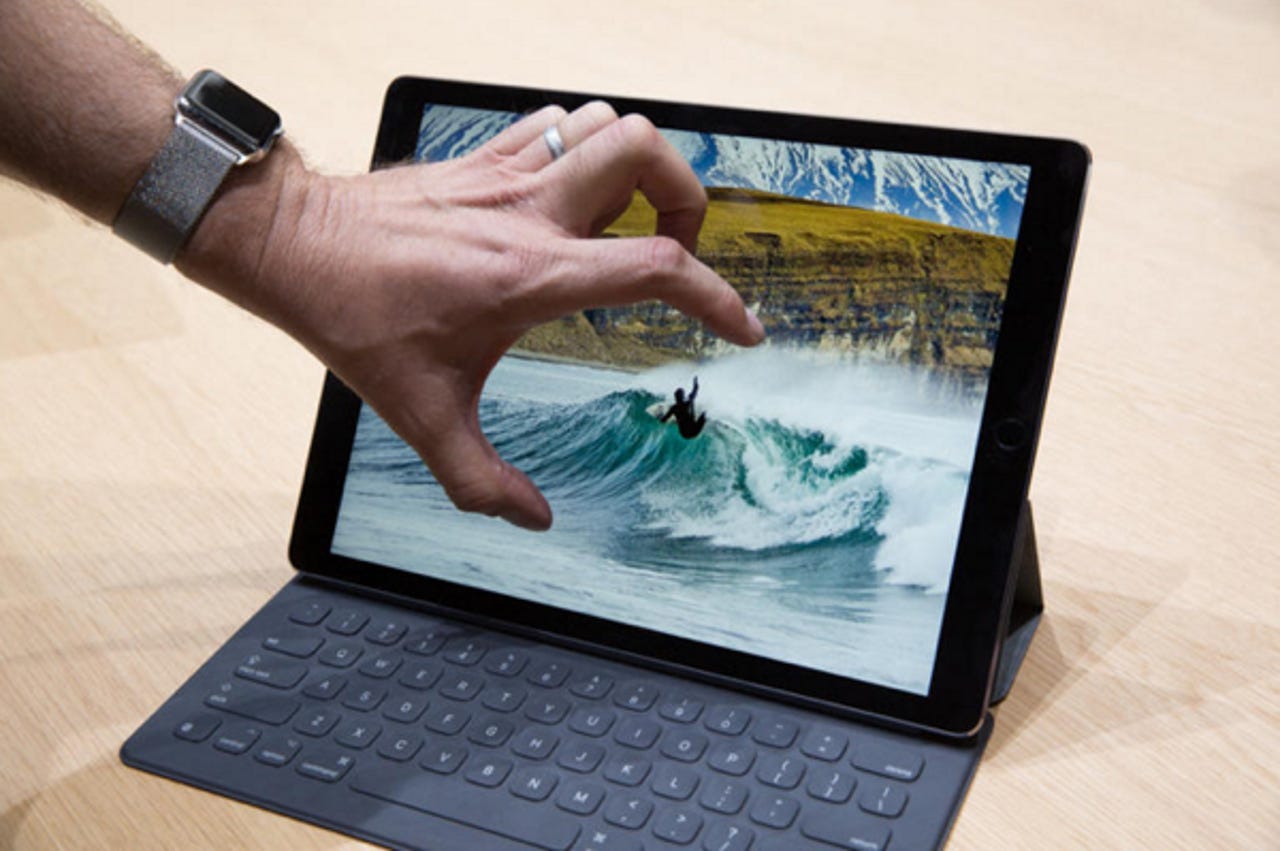iPad Pro's tall order: Making the iPad material to Apple again

Apple's iPad sales are on the borderline of being immaterial to the company, but some analysts are betting that enterprise sales of the iPad Pro can turn the product line around.
The iPad Pro is available on Wednesday and the tablet with a 12.9-inch display is billed as a laptop replacement. Indeed, the iPad Pro may be more comparable to Microsoft's Surface than its smaller siblings.
What's unclear is whether the iPad Pro will be enough to juice sales overall. Apple CEO Tim Cook has been steadfast about the iPad's prospects. He cites consumer satisfaction, traction in the workplace and engagement. The upgrade cycle for the iPad is still being worked out.
Apple iPad Pro online orders start November 11 in four dozen regions | iPad Pro: It's just a big iPad | Why tanking iPad sales are partly down to the iPad 2 | Apple's Q4: 7 business technology takeaways | IBM-Apple app count hits 50 with healthcare, sales, and transport additions | Apple's enterprise push will depend on more than just hardware | Apple iPad Pro vs. 12-inch MacBook: A tough choice for me | Apple's iPad Pro vs. MacBook vs. Surface Pro: The price, spec bake-off | Apple launches iPad Pro: Promises desktop performance in tablet
Nevertheless, the iPad franchise is sucking wind relative to the iPhone. Apple's annual report shows the iPad is 10 percent of overall sales. Once a business falls below 10 percent a company doesn't have to break it out. In other words, the iPad could be lumped into "other" with the Apple Watch and iPod if current trends continue.
Here's what the data says about the iPad.
Apple explained:
Net sales and unit sales for iPad declined during 2015 compared to 2014. The Company believes the decline in iPad sales is due in part to a longer repurchase cycle for iPads and some level of cannibalization from the Company's other products. iPad ASPs declined by 5% during 2015 compared to 2014, primarily as a result of the effect of weakness in most foreign currencies relative to the U.S. dollar and a shift in mix to lower-priced iPads.
Enter the iPad Pro (CNET take).
While consumers weigh upgrading their iPads vs. buying a MacBook or MacBook Air (we'll assume current iPad owners will stay in the Apple orbit), the enterprise is seen as a cure for the company's tablet sales.
FBR analyst Daniel Ives issued a research note with a few predictions for Apple. He predicted the Apple Car effort will gain steam, China sales will surge, streaming TV will be unveiled and the iPhone will continue to sell well.
iPad Pro, in pictures
Ives' most tenuous prediction was about the iPad Pro. "iPad Pro sales will help reverse the negative tablet trend seen over the last year, with success being found on the enterprise market and thus representing 15% of Apple's revenues (versus ~10% today)," said Ives.
If you assume iPhone sales continue to chug along, it would take a minor miracle for the iPad Pro to become 15 percent of total Apple sales.
For instance, companies would have to replace laptops with the iPad Pro, have enough unique enterprise apps to make the switch and move more away from Windows. With a bevy of 2-in-1 devices from the PC market, it's unclear that the iPad Pro can dominate that much. Enterprises want to combine tablet and PC upgrade cycles, but an iPad Pro is likely to be just a part of the equation. It's also possible the iPad Pro takes corporate Macbook sales.
Bottom line: The iPad Pro will fare well in the enterprise, but it has tough competition from PC rivals as well as its siblings. I'd still opt for a Macbook in most corporate situations. Apple will be an enterprise winner, but it's doubtful that the iPad Pro will move the needle for the tablet as a percentage of sales.
